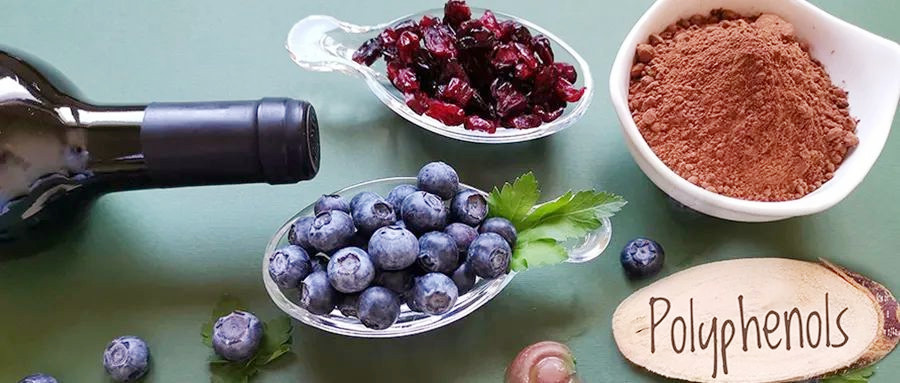Applications of polyphenols extract for food and beverage industrial
Polyphenols are widely found in the skin, roots, stems, leaves and fruits of plants. They are a class of complex plant secondary metabolites in nature, and their content in plants is second only to cellulose, hemicellulost and lignin. A large number of studies have shown that plant polyphenols have a variety of biological activities due to their unique chemical structure, such as antioxidant, antibacterial, antiviral and prevention of chronic diseases such as cardiovascular disease, cancer, osteoporosis, neurological decline and other biological activities, so it is known as the “Seventh class Nutrients “.
Polyphenols have been widely used in the food and beverage industry. It may be used in alcoholic beverages, non-alcoholic beverages, or smoothies used as a colorant or flavor enhancer and add antioxidant capacity of these drinks. It also has the potential as an ingredient for functional foods due to their bioactive properties, which can include antimicrobial, anti-inflammatory and even anticancer effects. Also, polyphenols act as preservatives in certain products such as jams, jellies and syrups. Here we introduce some uses of natural polyphenols in the food and drinks industries.
Polyphenols for Food preservatives
- Apple polyphenols
- Grape polyphenols
- Pomegranate polyphenols
- Bayberry polyphenols
- Camphor leaf polyphenols
- Blueberry leaf polyphenols
- ……
Polyphenols are natural antioxidants that help to protect foods from oxidation, preserve flavor and extend shelf life. They can inhibit the growth of bacteria and molds, which helps maintain food safety and quality over a longer period of time. Additionally, it act as an antioxidant to reduce oxidation damage in food and even enhances aroma and flavor in beverages such as alcoholic drinks or smoothies.
Preservatives for meat products
During the storage of meat products, natural polyphenols such as tea polyphenols, resveratrol and rosmarinic acid can not only be incorporated into packaging materials by embedding and microencapsulation methods to ensure their antioxidant and antimicrobial activity and prolong the shelf life of minimally processed meat products, but also can be directly added into meat products to interact with hemoglobin to preserve the color of meat products, limit microbial growth and delay protein oxidation.
The main causes of meat spoilage include microbiological contamination, fat oxidation, protein oxidation and pigment degradation. The coating preservative prepared by tea polyphenol, allicin and natural edible film solution was used to study the coating preservation of cooling meat. It was found that the coating preservative could inhibit the growth and reproduction of bacteria in meat, thus slowing down the decomposition of protein. The results showed that the coating agent composed of 0.7% tea polyphenols, 0.4% allicin and film solution (3% soluble starch, 0.6% sodium alginate, 0.2% monoglycerate) had a good effect on the preservation of the film of the chilled meat, and could make the fresh life of the chilled meat reach more than 19 days.
Preservative for aquatic products
With the increase in people’s demand for aquatic products and the improvement of their freshness, the preservation of aquatic products in the process of transportation has been widely studied. Polyphenols can direct contact with aquatic products such as large yellow croaker, grass carp and shrimp paste, effectively inhibit bacterial reproduction, delay deterioration and prolong shelf life. In addition, polyphenols with antibacterial activity can also be used as packaging film to extend the shelf life of aquatic products. NIE et al. found that sodium alginate coating soaked by tea polyphenols can significantly reduce the total volatile basic nitrogen, lipid oxidation and protein decomposition levels of Japanese perch fillets during storage. Su et al. soaked a fresh large yellow crock with 2mg/mL bayberry leaf polyphenol solution and found that it could effectively prolong the shelf life of a large yellow crock under refrigeration conditions by inhibiting bacterial proliferation and fat oxidation.
Preservative for other foods
In addition to the preservation of meat and aquatic products, plant polyphenols can also be applied to the preservation of flour products, fruits, fruit juice, dairy products, condiments and other food, but there are relatively few research applications. TURCO et al. found that polyphenols in leguminous flour can reduce blood sugar, which provided a new idea for making functional flour products. The application of polyphenols in dairy products can enhance the flavor of dairy products, inhibit the oxidation of fatty substances in dairy products, slow down the discoloration and corruption of dairy products during deep processing, and improve the commodity value of dairy products. MUNIANDY et al. showed that polyphenols would not affect the fermentation of lactic acid bacteria in a certain concentration range, and could also improve the antioxidant activity of yogurt stored at 4 ℃ for 21 days.
The results showed that 1.0 g/kg of Seabuckthorn leaf polyphenols had an obvious fresh-keeping effect on apple juice. The Browning of apple juice was significantly inhibited within 2h when the dosage of polyphenols in seabuckthorn leaves was 0.5-1.5 g/kg. Curcumin in curry powder can be used as a natural preservative and natural colorant in sauces, marinated products and convenient food seasonings. In addition, the combination of natamycin (0.01 g/kg) and polyphenol (0.2 g/kg) in soy sauce had better preservative effect and safety than potassium sorbate.
Polyphenols for Functional food
- Tea polyphenols
- Grape polyphenols
- Apple polyphenols
- Soy isoflavones
- Silymarin
- Resveratrol
- Quercetin
- Chlorogenic acid
- ……
Polyphenols are colorant Polyphenols have the potential for use in functional foods due to their beneficial bioactive properties, which may be beneficial for human health. They have been demonstrated to have a wide variety of health benefits, including reducing oxidative stress and inflammation, as well as protecting against cardiovascular disease and cognitive decline. The development of functional food containing polyphenols and the beneficial effects of polyphenols in human body is one of the focuses of research on the development and application of plant polyphenols.
Since cardiovascular diseases, aging and other pathophysiology are related to oxidative stress caused by free radicals, the prevention of cardiovascular diseases and anti-aging activities of plant polyphenols are closely related to their antioxidant activities, but at the same time, antioxidant effect is not the only influencing factor. Oxidative stress plays an important role in the occurrence and development of cardiovascular diseases such as atherosclerosis, hypertension, myocardial ischemia or reperfusion injury, and cardiomyopathy. Therefore, effective antioxidants can play a role in preventing cardiovascular diseases. Resveratrol is a polyphenol compound found in grapes, peanuts, mulberries and other plants, and has been widely studied for its superior antioxidant properties. Studies have shown that resveratrol can prevent cardiovascular diseases by preventing lipid peroxidation, increasing SOD and catalase content, and inhibiting xanthine oxidase activity.



